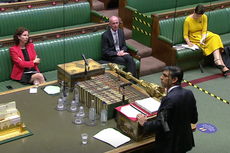Rishi Sunak’s Job Support Scheme sounds radical but it only took two minutes to collapse as a viable proposal
The chancellor delivered his Winter Economic Plan today because the Budget was cancelled. After all, there’s nothing budget about Covid-19

As all five feet six of Rishi Sunak rose to his feet at the despatch box of the House of Commons, gaining no perceptible altitude as he did so, it was as fine a moment as any to take stock of how we got here.
The empty air weighed heavy upon him. The hazard tape still stuck down to the floor of the chamber a reminder that these remain very dangerous times.
Can it really be a mere six months ago, in this room, that he was delivering his first Budget? Back then, a government minister, Nadine Dorries, had tested positive for Covid-19 a matter of hours before. Makeshift police tape had been placed over the door to her office, but everyone just crammed in regardless.
Sunak announced, to genuine cheers, that he had allocated fully £12bn to sort out this coronavirus business. This has turned out not to be enough, by somewhere in the region of £379bn.
Perhaps, in hindsight, it might have been then that it should have become clear that the government didn’t really have a clue what it was doing. But then, it’s easy to say with hindsight. Of course, many people said as much with foresight as well, but let’s not get too bogged down in all that.
He wasn’t delivering a Budget today. That quite rightly had to be cancelled. A “Budget” is just not the right word for the days in which we now live. Budgeting involves setting a spending limit and sticking to it. Budget hotels and budget car rentals tend to imply value for money.
There’s nothing budget about Covid-19. Oh no. That’s why this had been called merely a Winter Economic Plan, and it served to remind that, oh yes, winter is coming.
The furlough scheme, coming in at £4bn a month for the last seven months, was coming to an end, to be replaced by the Job Support Scheme. This was radical, in that it would involve actual employers paying their own staff to do actual work, rather than the government. Well, it would in theory.
For those of us whose job it is to attempt to find humour in chafingly dry fiscal statements like this, the smart move for some years now has been not to worry too much about the speech itself, but just wait for the aftermath. For most of the last 10 years, it has been possible to time, almost in seconds, how long it takes for a Budget to unravel, once the economists and the financial analysts get hold of it, clear out the smoke and shatter the mirrors.
The Job Support Scheme took about two minutes to collapse as a viable proposal. Its central premise is that companies can pay their staff a third of their wages to work a third of their hours, and then the remaining two-thirds, or 66 per cent of the cash, will be borne in equal 22 per cent chunks by the employee, who’ll simply lose it, the employer and the government.
It means that companies will be required to pay staff 55 per cent of their wages to do 33 per cent of their work. Alternatively, they can sack them, and hire somebody else on a part-time basis. It is hard to see this not happening. It is even harder to see how a waiter, a DJ, an airline pilot, a shop worker or anyone involved in, say, the events industry, can even hope to do 33 per cent of their job, when a pandemic has made it close to impossible to provide their services to customers who don’t want them anyway.
It was, however, good while it lasted. Some months ago, one of Sunak’s predecessors, George Osborne, pointed out that a popular chancellor is a chancellor who’s not doing his job properly.
If the halo slips on Sunak, it will also mark the daylight being let in on the magic. The magic money tree, to be precise, which has a decidedly autumnal look about it, and we all know what comes next.
Join our commenting forum
Join thought-provoking conversations, follow other Independent readers and see their replies
Comments

Bookmark popover
Removed from bookmarks